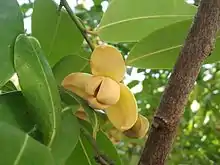Sphaerocoryne affinis
Sphaerocoryne affinis (notable synonyms: Mitrella mesnyi)[1] is a species of flowering plant in the soursop family, Annonaceae. The fragrant flowers of Sphaerocoryne affinis are highly regarded in Cambodia and Thailand.
| Sphaerocoryne affinis | |
|---|---|
 | |
| Scientific classification | |
| Kingdom: | Plantae |
| Clade: | Tracheophytes |
| Clade: | Angiosperms |
| Clade: | Magnoliids |
| Order: | Magnoliales |
| Family: | Annonaceae |
| Genus: | Sphaerocoryne |
| Species: | S. affinis |
| Binomial name | |
| Sphaerocoryne affinis (Teijsm. & Binn.) Ridl.[1] | |
| Synonyms | |
| |
Description
This plant has a yellowish-white flower with a single alternate leaf. It has a height of 8–12 m and a stem diameter of 20–30 cm. It gives out an attractive smell in the late afternoon and evening, a distinctive fragrance that can be smelled from a long distance.[2]
Cultural significance
In Cambodia
The rumduol (Khmer: រំដួល), as it is known in Cambodia, is often planted in gardens and parks as it is valued for its fragrance. The flowers are used to make a scented lip wax called kramuon rumduol (Khmer: ក្រមួនរំដួល).[3] Several regions in Cambodia are named after this flower, such as Romdoul District and Ou Rumduol.
In a 2005 royal decree by King Sihamoni of Cambodia, the rumduol was proclaimed the national flower of Cambodia, however this decree references an invalid synonym for this taxon, Mitrella mesnyi.[3] The rumduol is often referred to as Popowia aberrans on botanical signs and as noted by Headley in the Cambodian-English dictionary.[4][5]
References
- "The Plant List (2013). Version 1.1. Published on the Internet". The Plant List. July 4, 2014. Retrieved 4 July 2014.
- ASEAN National Flowers Archived 2011-10-31 at the Wayback Machine
- "ROYAL DECREE on Designation of Animals and Plants as National Symbols of the Kingdom of Cambodia" (PDF). Forestry Administration of Cambodia. Retrieved July 4, 2014.
- "EcoPort Picture : Popowia aberrans, Anonaceae, Cambodia, Phnom Penh".
- Cambodian-English Dictionary by Robert K. Headley, Rath Chim, and Ok Soeum (1997, Dunwoody Press, ISBN 0-931745-78-0)